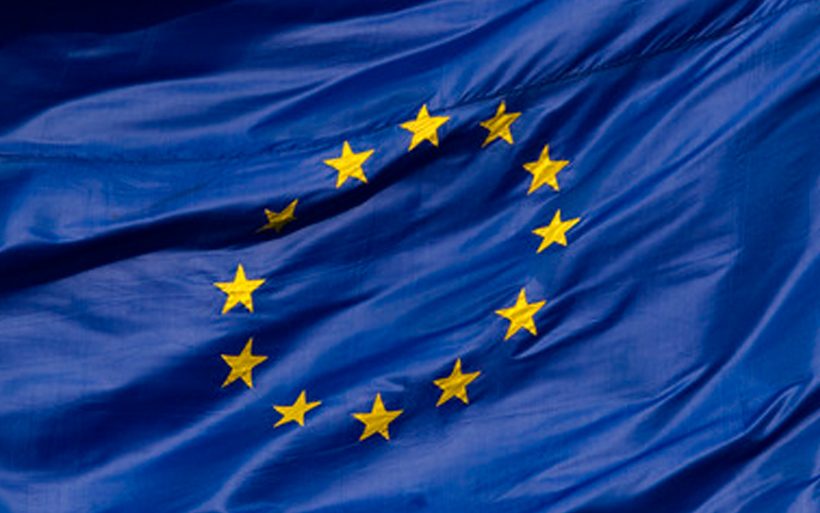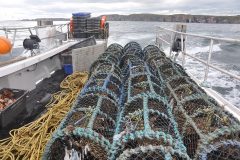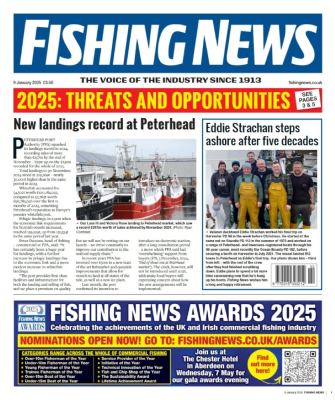Scottish minister spells out Brexit downsides
Strategy to get best possible deal
Brexit is ‘the story that never ends’, but Scotland needs to get the best deal in the next 12 months, whatever happens, reports Tim Oliver
This was the view of Scottish fisheries minister Fergus Ewing, speaking at the Skipper Expo in Aberdeen, who warned of the downsides and dangers of Brexit for exports and processing.
The minister said that the Brexit process will be ‘difficult and challenging’, and warned that EU fishermen would ‘fight tooth and nail’ to maintain their current fishing entitlements in UK waters.
It was known that fishermen from Denmark and other EU countries were trying to acquire track records of fishing in UK waters, and ‘it doesn’t take a genius to work out why’.
He said that despite the Brexit delays, the Scottish government is working on the basis that it will go ahead, and it has a strategy for that scenario. He stressed the need for the Scottish government to work closely with the industry on the issues, so that it had the facts about what was going on.
He said the dangers and downsides of Brexit were now better understood than they were at the time of the Brexit referendum, and that Scotland was working to get the best deal possible, whatever happened with Brexit.
The economic value of the industry’s catch had doubled in the past 10 years, and he wanted to see that carry on over the coming years.
But with 77% of exports going to Europe, that meant it was vital to retain access to the EU markets – but it would be difficult to hang on to them if there were tariff barriers and other non-tariff issues, such as export health certificates, border delays and increased bureaucracy. Border delays could render a seafood consignment by lorry ‘worthless’.
Spelling out the potential bureaucratic burden and costs of Brexit, he said an extra 150,000 health export certificates per year, costing £15m, would be needed for the whole sector, including aquaculture.
A ‘staggering’ figure was the potential increase in work involving environmental health officers, with 112,000 extra man-hours filling in forms, and increased bureaucracy to get access to the market, compared to ‘the current seamless basis’.
Other downsides to Brexit were the possible loss of foreign workers, and of EMFF grants for many industry projects. The minister said that 70% of workers in the processing sector in Scotland were non-UK workers.
But the minister said, “On the other hand, whatever happens, if there are opportunities, my job, working with my officials, is to get the best possible deal for the fishing sector. I can’t overemphasise how important that part of my job is going to be.
“Our job will be making sure that the Scottish interest is paramount when we look at possible negotiations as to future fishing entitlements.”
He said the main issue for many fishermen was still the ‘sea of opportunity’ they expected from Brexit. “I’ve had discussions with leading fishermen this morning who know their EU colleagues will fight tooth and nail to preserve what they’ve got. Everyone is aware that the negotiations will be very challenging indeed, and that’s why I’m determined that we get the best possible deal.
“There has been a lot of work behind the scenes to focus on the detail of that – how we have a proper strategy to get that best deal.”
No confidence in Westminster government
Mr Ewing also expressed concern that Scotland’s fishing interests were not at the forefront of the Westminster government’s priorities.
The fishing industry’s interests ‘are right at the top of my list of priorities, and will be over the coming months, so that in the event that Brexit goes ahead, we will not be slow in advancing Scotland’s interests to the UK government. Otherwise, I am not confident that Scotland’s fishing interests will be advanced properly,” said the minister.
There was frustration in Scotland that the UK government ‘does not seem to have thought any further beyond the next failed vote’.
“My job, whatever happens, working with officials, the industry and key stakeholders, is to get the very best deal for Scotland and Scottish fishermen, and to make sure the UK government has our own clear direct input in any and all negotiations,” said Mr Ewing.
This already happened in negotiations with third countries such as Norway and Faroe, he said, and Brexit would add a new dimension. “What’s new is that there could be Brexit, and we need to continue and increase our role to make sure that Scotland’s interests are not only advanced and maximised, but that there is no possibility of any neglect or even betrayal of those interests.
“Some of the decisions in relation to Brexit were made without any reference to Scotland at all, not least the linking of a fishing deal post-Brexit with trade – something UK ministers said would never be done – and it was done without any consultation with us whatsoever.
“The suggestion of the neglect of Scottish interests is not a speculative matter, but one where there is evidence that sadly, the London government really does not have the Scottish fishing industry at the top of its list of priorities.”
The minister said there had never been any serious advancement of the Scottish case by the Westminster government, other than ‘grandstanding’ about the ‘sea of opportunity’.
It was also ‘deeply regrettable’ that the UK government had still failed to implement the revised concordat that sets out the fisheries management responsibilities of the devolved administrations, and their relationship to UK central government.
“It’s taken far, far too long – Brexit isn’t the only thing that seems to take forever,” said the minister. The lack of implementation was preventing Scotland from securing further investment in the fishing sector, adding to the general uncertainty of the Brexit delay.
Westminster had also failed to say what would replace the existing EU EMFF grant system. Current EMFF funding was nearly exhausted, and there had still been no clarity from the UK government about what would replace it.
“Before the referendum, we were told that all the funding would be matched at the same level – in fact, there might even be more. That’s what George (Eustice, the former fisheries minister) said – well, where is it?” asked Fergus Ewing.
“EMFF is over a seven-year multi-annual cycle, whereas the UK’s plans are year to year, and if you’re doing a development project like Peterhead harbour, you can’t plan on a yearly basis.
“Very few major projects can be completed within 12 months, so you need longer surety than 12 months that money will be available.”






